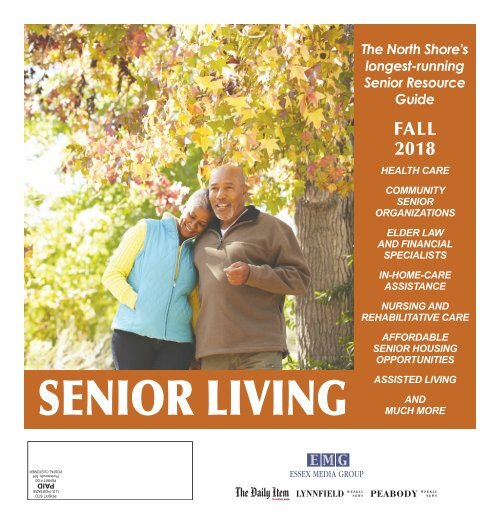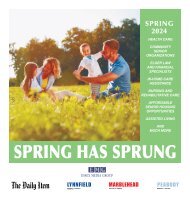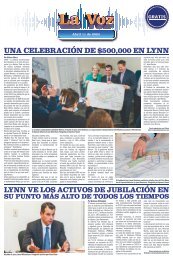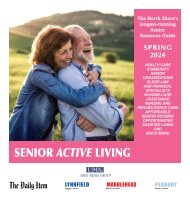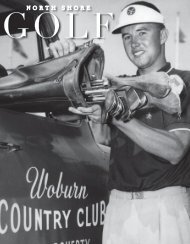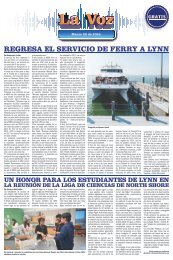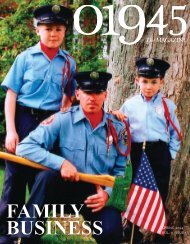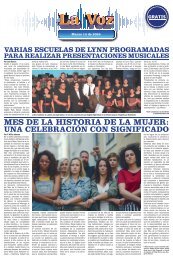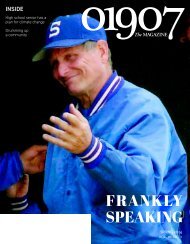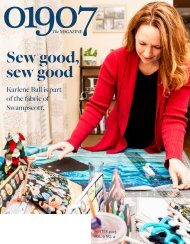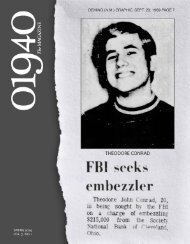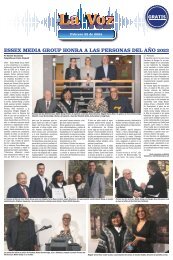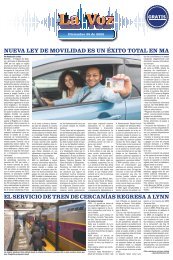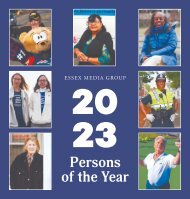Senior Living Fall 2018
You also want an ePaper? Increase the reach of your titles
YUMPU automatically turns print PDFs into web optimized ePapers that Google loves.
The North Shore's<br />
longest-running<br />
<strong>Senior</strong> Resource<br />
Guide<br />
FALL<br />
<strong>2018</strong><br />
HEALTH CARE<br />
COMMUNITY<br />
SENIOR<br />
ORGANIZATIONS<br />
ELDER LAW<br />
AND FINANCIAL<br />
SPECIALISTS<br />
IN-HOME-CARE<br />
ASSISTANCE<br />
NURSING AND<br />
REHABILITATIVE CARE<br />
AFFORDABLE<br />
SENIOR HOUSING<br />
OPPORTUNITIES<br />
SENIOR LIVING<br />
ASSISTED LIVING<br />
AND<br />
MUCH MORE<br />
ESSEX MEDIA GROUP<br />
LYNNFIELD WEEKLY<br />
NEWS<br />
PEABODY WEEKLY<br />
NEWS
2 ESSEX MEDIA GROUP SENIOR LIVING FALL <strong>2018</strong><br />
SENIOR LIVING FALL <strong>2018</strong><br />
INDEX OF ADVERTISERS<br />
ABC Home Healthcare Professionals .................................................................................................................................... 3<br />
Adult Foster Care of the North Shore .................................................................................................................................. 15<br />
All Care ..................................................................................................................................................................................... 7<br />
Brooksby Village ................................................................................................................................................................... 13<br />
Cuffe-McGinn Funeral Home .................................................................................................................................................. 5<br />
Dr. Kozlauska ........................................................................................................................................................................... 5<br />
Law Office of Julie Low ........................................................................................................................................................... 6<br />
Lynn Economic Opportunity .................................................................................................................................................. 8<br />
Nichols Village ....................................................................................................................................................................... 16<br />
Puritan Lawn Memorial Park .................................................................................................................................................11<br />
Shore Village Apartments ....................................................................................................................................................... 2<br />
Solimine Funeral Homes......................................................................................................................................................... 2<br />
A PUBLICATION OF ESSEX MEDIA GROUP<br />
LYNNFIELD WEEKLY<br />
NEWS<br />
PEABODY WEEKLY<br />
NEWS<br />
David J. Solimine, Jr.; Joel C. Solimine;<br />
David J. Solimine, Sr.<br />
Family Owned and Operated<br />
Caring for Our Community in Countless Ways<br />
The caring and experienced professionals at Solimine Funeral Homes are<br />
here to answer your questions, provide support and guide you and your<br />
family before, during and after a funeral.<br />
We offer a range of personalized funeral, memorial and cremation services<br />
to suit your family’s wishes and requirements.<br />
Call us today for a free consultation.<br />
(781) 595-1492<br />
www.solimine.com<br />
$1300<br />
Shore Village is conveniently located near area shops and restaurants, public transportation and<br />
beach. Our modern 1-bedroom apartments are equipped with full kitchens, washer and dryer in<br />
unit and walk-in closets. Community room with fireplace and rooftop deck with great views.<br />
426 Broadway (Rt.129)<br />
Lynn, MA 01904<br />
67 Ocean Street (Rt. 1A)<br />
Lynn, MA 01902<br />
Managed by Crowninshield Management Corporation
SENIOR LIVING FALL <strong>2018</strong> ESSEX MEDIA GROUP 3<br />
<strong>Living</strong> well at home<br />
As seniors, many of us have spent<br />
time caring for others. It may have<br />
been a child, spouse, friend or family<br />
member. Now that we’re older,<br />
we may notice that some things that<br />
were once easy are now more challenging<br />
– yet we might find it difficult<br />
to know when or how to ask for<br />
help. Furthermore, our independence<br />
is important to us and that makes us<br />
hesitant to ask for assistance at all.<br />
Don’t wait<br />
Asking for help doesn’t mean giving<br />
up independence. If you consider<br />
the alternative, you’re actually being<br />
proactive in supporting your own<br />
independence! What do I mean you<br />
ask? Consider laundry, which is a<br />
chore for all of us. Having someone<br />
come in for two hours to assist with<br />
getting the laundry done could eliminate<br />
a fall that could have lead to a<br />
debilitating injury and hospital stay.<br />
Perhaps you have trouble getting out<br />
of the house? Having someone help<br />
with the grocery shopping can help<br />
ensure you have fresh, healthy food<br />
readily available to eat. When you<br />
consider the alternative, a little assistance<br />
really goes a long way and<br />
that is where ABC Home Healthcare<br />
can help!<br />
Why an agency?<br />
You may have seen an ad for a<br />
caregiver looking to help seniors at<br />
home. Sounds less expensive than<br />
going through an agency right? In<br />
this day and age, it’s best not to be<br />
“penny wise and pound foolish”.<br />
Working with a quality agency like<br />
ABC Home Healthcare ensures the<br />
caregiver in your home can be trusted<br />
and that they are trained to help<br />
you in the best way possible. All our<br />
workers are carefully screened, bonded<br />
and insured. ABC also takes care<br />
of scheduling, supervision and taxes.<br />
All you need to do is call!<br />
What’s the best part?<br />
You have nothing to lose by calling<br />
ABC! Just that one call can help you<br />
build a gradual relationship with a<br />
reliable agency that can support you<br />
when you need it most. In establishing<br />
a relationship with ABC, you are<br />
giving yourself peace of mind that<br />
if an event, such as a debilitating<br />
illness or fall, occurs and you need<br />
in-home assistance, you can rely on<br />
an agency that you know and trust.<br />
Having this relationship will allow<br />
you to be more in control of your<br />
decision-making based on the facts<br />
and your experience rather than an<br />
impulsive, emotional response in<br />
the moment. By working with ABC<br />
Home Healthcare Professionals, you<br />
can rest assured that you are getting<br />
the quality care that you deserve.<br />
For most of our adult lives we’ve<br />
had the ability to make choices about<br />
how we want to live. Just because we<br />
are getting older doesn’t mean that<br />
we don’t still have choices. The choice<br />
is yours and the key to being successful<br />
is being proactive!<br />
Jeannette Sheehan, MSN, CCM,<br />
RN, Board Certified Nurse Practitioner<br />
is founder and owner of ABC<br />
Home Healthcare Professionals,<br />
providing private medical and nonmedical<br />
home care services to Metro<br />
Boston, North Shore, Merrimack Valley<br />
and the Cape Ann communities.<br />
When researching home care services,<br />
give us a call at 781-245-1880, or visit<br />
our website at www.abchhp.com.<br />
Home<br />
Healthcare®<br />
Professionals<br />
Let our trained team of compassionate caregivers<br />
help keep you safe at home.<br />
From homemaking to skilled nursing,<br />
when it comes to home care - trust the professionals.<br />
Call for your FREE In-home Assessment<br />
781-245-1880<br />
www.abchhp.com<br />
All services supervised by Registered Nurses.<br />
PART-TIME<br />
Flexible Hours<br />
Work Close<br />
to Home<br />
ENJOY WORKING<br />
WITH SENIORS?<br />
Help our clients in<br />
their homes<br />
Light Housekeeping<br />
Meal Preparation • Laundry<br />
Shopping • Companionship<br />
COMPETITIVE<br />
PAY<br />
FREE Training<br />
PAID<br />
TRAVEL TIME<br />
Plus Mileage<br />
Rembursement<br />
Call 781-914-3283<br />
or visit abchhp.com<br />
to learn more.
4 ESSEX MEDIA GROUP SENIOR LIVING FALL <strong>2018</strong><br />
Your best age<br />
for everything<br />
By Lori Borgman<br />
TRIBUNE NEWS SERVICE<br />
A chart titled “The Age You Peak at<br />
Everything,” published by Business<br />
Insider, was sent my way and was an<br />
enjoyable read — if you enjoy waves<br />
of uneasiness that roll your stomach.<br />
Lest I sound somewhat despondent,<br />
which is possible since, according to<br />
the chart, my last Life Satisfaction<br />
Peak was at age 23 and my next one<br />
will not occur until age 69, the selling<br />
point of the chart is that growing<br />
older comes with benchmarks of contentment.<br />
One can only hope.<br />
Of course, there is a lot of ground<br />
to cover between youth and age with<br />
numerous peaks along the way, some<br />
of which you have probably already<br />
missed.<br />
The peak age to learn a foreign<br />
language? Age 7. Yep, that ship has<br />
sailed; bon voyage.<br />
In other bad news, your brain processing<br />
power peaks around age 18.<br />
A moment for reflection on that<br />
one. If brain processors peak at age<br />
18, but greater life satisfaction lies<br />
beyond 18, could it be that contentment<br />
is tied to lower brain capacity?<br />
Just asking.<br />
Muscle strength tends to peak at<br />
age 25, followed by the peak likelihood<br />
of finding a marriage partner,<br />
which occurs around age 26. The<br />
sequencing of those two — peak<br />
strength followed by marriage — is<br />
entirely logical as marriage takes<br />
strength.<br />
Oh, does marriage take strength.<br />
Right, honey?<br />
Honey just shouted, “Yes!”<br />
The peak for bone mass is age 30,<br />
for playing chess, age 31, and for remembering<br />
faces, age 32. Your best<br />
age for the ability to focus is 43.<br />
Where was I?<br />
Let’s be honest; we all know what<br />
follows peaks. Valleys. The chart does<br />
not note valleys, but it should. The<br />
chart uses a straight line marked<br />
with dots for peaks, but realistically,<br />
life often looks more like a wild EKG.<br />
Out of the blue,<br />
age 69 pops up<br />
as when many<br />
experience life<br />
satisfaction —<br />
again — 46 years<br />
after the first<br />
satisfied life peak.<br />
For an upswing on the EKG, your<br />
arithmetic skills peak at 50. Apparently,<br />
the multiplication tables take<br />
far longer to gel than previously<br />
thought.<br />
Peak points appear increasingly<br />
sparse as the timeline progresses.<br />
There is a near dearth of activity between<br />
ages 52 and 68. If that’s where<br />
you are and it feels like a long, dry<br />
stretch, it probably is.<br />
Out of the blue, age 69 pops up as<br />
when many experience life satisfaction<br />
— again — 46 years after the<br />
first satisfied life peak.<br />
The two remaining peaks are significant.<br />
Wisdom really may come<br />
with age. Psychologists gave groups<br />
of people a conflict and asked for insights,<br />
responses and possible outcomes.<br />
The oldest age group — those<br />
in the 69-90 age range — did better<br />
than the other ages on almost every<br />
count.<br />
The final peak comes at age 82 and<br />
is for psychological well-being. The<br />
82- to 85-year-old age group gave the<br />
highest average number, which was 7<br />
on a scale of 10.<br />
Not a bad crescendo. Not bad at all.<br />
Repeat after me: The best may be<br />
yet to come, the best may be yet to<br />
come.<br />
Quinn on Nutrition:<br />
Nourishing healthy hair<br />
By Barbara Quinn<br />
THE MONTEREY COUNTY HERALD<br />
A reader writes: “I am a 70+ woman<br />
who is losing her hair! I’m not on radiation<br />
or chemotherapy and am in generally<br />
good health. A couple of years<br />
ago, I noticed my hair falling out, and<br />
now as it tentatively grows back very<br />
slowly, it is even thinner and finer<br />
than before (and continues to shed).<br />
I began taking biotin at my (doctor’s)<br />
advice. It doesn’t seem to have<br />
done anything to correct the loss. Can<br />
you give me any advice about supplements<br />
other than biotin, or any foods<br />
I might be missing for hair growth?<br />
My nails are very thin and subject<br />
to splitting as well. Both my parents<br />
died with hair on their heads, but I’m<br />
not sure I will!”<br />
— Linda K.<br />
Dear Linda,<br />
You did right to consult your doctor<br />
on this, since he or she hopefully<br />
knows your total health history. Nutrition<br />
experts say a deficiency of biotin<br />
is extremely rare. That said, a deficiency<br />
can cause a gradual thinning<br />
and loss of hair all over the body, according<br />
to the NIH Office of Dietary<br />
Supplements. Other symptoms of biotin<br />
deficiency can include skin rashes<br />
and brittle nails. By the way, there<br />
PHOTO | TRIBUNE NEWS SERVICE<br />
Nutrition experts say a deficiency of biotin is extremely rare, but a deficiency<br />
can cause a gradual thinning and loss of hair all over the body.<br />
is more evidence that biotin supplements<br />
may help brittle nails than<br />
there is about their effect on hair loss.<br />
A woman your age needs about 30<br />
micrograms of biotin a day, according<br />
to the latest recommendations. Good<br />
sources include eggs, fish, pork, beef,<br />
sunflower seeds and sweet potatoes.<br />
And steer clear of too much alcohol;<br />
it can interfere with the absorption of<br />
biotin.<br />
Nutritionally, our hair follicles —<br />
the cells in our skin that grow hair<br />
— use a variety of nutrients to produce<br />
healthy hair. A deficiency of one<br />
or more key nutrients can affect the<br />
structure as well as the growth of<br />
hair, say experts.<br />
Nutrients that can literally make<br />
your hair fall out if they are deficient<br />
in the diet include iron, protein, niacin<br />
and zinc. Foods that possess all of<br />
these nutrients include fish, poultry,<br />
lean meat, eggs and legumes.<br />
Omega-3 fatty acids found in fish,<br />
flax and walnuts are also essential to<br />
shiny, healthy hair.<br />
I like that you asked about foods<br />
— not just supplements — that may<br />
benefit hair growth. Concentrated<br />
doses of some nutrients, such as you<br />
find in some dietary supplements,<br />
can backfire if you take too much.
SENIOR LIVING FALL <strong>2018</strong> ESSEX MEDIA GROUP 5<br />
CUFFE-McGINN<br />
FUNERAL HOME<br />
By JoNel Aleccia<br />
KAISER HEALTH NEWS<br />
Of all the indignities that come<br />
with aging, excessive earwax may be<br />
the most insidious.<br />
Don’t laugh.<br />
That greasy, often gross, buildup<br />
occurs more often in older ears than<br />
those of the young, experts say. And<br />
when it goes unrecognized, it can pose<br />
serious problems, especially for the 2.2<br />
million people who live in U.S. nursing<br />
homes and assisted living centers.<br />
“The excessive amount (of earwax)<br />
can cause hearing loss or ringing in<br />
your ears. Some people experience vertigo,<br />
which increases the risk of falling,”<br />
said Jackie Clark, a board-certified audiologist<br />
who is president of the American<br />
Academy of Audiology. “Right now,<br />
we see some correlation between hearing<br />
loss and cognitive decline.”<br />
Earwax — which is not really wax<br />
at all, but a substance called cerumen<br />
that binds with dirt, dust and debris<br />
— is normally produced by the body<br />
as a way to clean and protect the<br />
ears. In most people, the self-cleaning<br />
process works fine.<br />
But in others — including about 10<br />
percent of young children, 20 percent<br />
of adults and more than 30 percent of<br />
elderly and developmentally disabled<br />
people — the wax collects to the point<br />
PHOTO | TRIBUNE NEWS SERVICE<br />
Janie York examines the ear of Elaine Martin at the SilverRidge<br />
Assisted <strong>Living</strong> facility in Gretna, Neb.<br />
Earwax, of all things, poses<br />
a risk in long-term care<br />
where it can completely block the ear<br />
canal.<br />
Up to two-thirds of people in nursing<br />
homes may suffer from that condition,<br />
known as impaction, according<br />
to 2017 guidelines for removal of<br />
impacted earwax issued by the American<br />
Academy of Otolaryngology-<br />
Head and Neck Surgery Foundation.<br />
In 2016, federal Medicare recipients<br />
logged nearly 1.7 million earwax<br />
removal services at a cost of<br />
more than $51 million, according to<br />
payment records analyzed by Kaiser<br />
Health News.<br />
“In elderly patients, it’s fairly common,”<br />
said Dr. Seth Schwartz, a Seattle<br />
otolaryngologist who led the most recent<br />
update of the guidelines. “It seems<br />
like such a basic thing, but it’s one of<br />
the most common reasons people present<br />
for hearing-related problems.”<br />
It’s so bad that Janie York, of Omaha,<br />
Neb., started Hear Now mobile<br />
hearing solutions, one of a growing<br />
number of businesses devoted to<br />
cleaning hearing aids and checking<br />
the ears of elderly people living in<br />
residential care settings.<br />
“It’s epidemic,” said York, whose<br />
clients now include 10 local centers.<br />
“About 3 in 5 people I see have some<br />
degree of impaction and most are<br />
completely impacted.”<br />
781-599-3901<br />
157 Maple St., Lynn | cuffemcginn.com<br />
781-334-2520<br />
700 SUMMER STREET<br />
LYNNFIELD<br />
LIFE WELL CELEBRATED<br />
Serving the community since 1934<br />
Proud member of the<br />
Dignity Memorial network<br />
JOHN KOZLAUSKA<br />
D.M.D.<br />
• All phases of general dentistry with emphasis on prevention<br />
• Tufts Dental Clinical Instructor for 8 years<br />
• Readers #1 Choice<br />
• Affordable treatment options<br />
• Complimentary consultation<br />
• <strong>Senior</strong> discounts<br />
• Call now!
6 ESSEX MEDIA GROUP SENIOR LIVING FALL <strong>2018</strong><br />
Wondering how to protect your assets?<br />
The Law Office of Julie Low can help<br />
The Law Office of Julie Low practices exclusively<br />
in estate planning and administration, elder law,<br />
and special needs planning.<br />
The firm designs customized, comprehensive<br />
will-based and trust-based estate plans to meet<br />
each client’s unique needs. Whether your goal is<br />
to protect assets from future long-term care costs,<br />
minimize estate taxes and administration fees,<br />
ensure a legacy for your descendants, provide<br />
for your needs in the event of incapacity, or protect<br />
and provide for a family member with special<br />
needs, the Law Office of Julie Low can design an<br />
estate plan that meets your objectives.<br />
Attorney Low opened her Beverly-based firm because<br />
she had a vision for the way law should be<br />
practiced — with a focus on the client instead of<br />
billable hours.<br />
She believes in creating an inviting, personable<br />
atmosphere where clients feel comfortable discussing<br />
very personal subjects. Attorney Low fully engages<br />
her clients in the design process, educating<br />
and guiding them to make informed decisions. The<br />
end result is a comprehensive plan clients understand,<br />
rather than a set of documents that have<br />
little personal meaning.<br />
The firm charges fixed prices instead of traditional<br />
hourly rates for estate planning. Ms. Low<br />
believes clients appreciate knowing the cost of services<br />
up-front and the open communication such<br />
an approach fosters.<br />
Client meetings are centered around important<br />
issues — not the clock — and are handled with a<br />
touch of lightheartedness, when appropriate, "because<br />
contemplating disability, incapacity or death<br />
is not a delightful or pleasant experience for most."<br />
Clients are invited to contact Julie, or a team<br />
member, with questions, without worrying about<br />
being billed for extra time. Daytime, as well as evening<br />
meetings, are available by appointment.<br />
One of the firm’s specialties is the creation of<br />
Long-Term Care Plans to help clients navigate<br />
the complicated regulations of Medicaid, Veterans<br />
Benefits, and other government programs.<br />
Because Julie is knowledgeable in planning for<br />
both types of Medicaid (traditional nursing home<br />
and the lesser known, but unbelievably beneficial,<br />
community programs), she reviews her clients’ options<br />
with an eye to all programs to ensure each<br />
plan provides later flexibility.<br />
In addition to being an accredited attorney with<br />
the Veteran’s Administration, Julie is a member of<br />
WealthCounsel, ElderCounsel, The National<br />
Academy of Elder Law Attorneys (NAELA), ElderLaw<br />
Answers and The Academy of Special<br />
Needs Planners.<br />
She graduated cum laude from Western New<br />
England University School of Law.<br />
In her free time, Julie volunteers with North<br />
Shore Elder Services’ Money Management Program,<br />
assisting local seniors with paying bills and<br />
budgeting, and on Northeast ARC’s Human Rights<br />
Committee.<br />
The Law Office of Julie Low provides complimentary<br />
workshops on the basics of Estate Planning<br />
and Long Term Care.<br />
In conjunction with a local Geriatric Care Manager,<br />
Julie has also produced a free and informative<br />
guide for navigating Long Term Care on the<br />
North Shore.<br />
Call the Law Office of Julie Low today to receive<br />
a copy, or to sign up for the next workshop.<br />
Elder Law<br />
Estate Planning<br />
Medicaid Planning<br />
Veterans Benefits<br />
Wills & Trusts<br />
Special Needs Planning<br />
Probate &<br />
Estate Administration<br />
For peace of mind, for those you love, estate planning!<br />
Saturday<br />
Septemeber 29<br />
10 a.m.-noon<br />
Law Office of<br />
PLLC<br />
Estate Planning • Elder Law • Special Needs<br />
Receive a half-price, one-hour consultation after attending<br />
one of our estate planning workshops.<br />
Tuesday<br />
October 2<br />
6:30-8:30 p.m.<br />
Saturday<br />
October 27<br />
10 a.m.-noon<br />
Tuesday<br />
Novemeber 13<br />
6:30-8:30 p.m.<br />
Saturday<br />
December 1<br />
10 a.m.-noon<br />
Space Space is is limited •• Registration is is required. Call today! Today! 978-922-8800<br />
4 Federal St., Beverly • www.lawofficeofjulielow.com<br />
Tuesday<br />
December 11<br />
6:30-8:30 p.m.
SENIOR LIVING FALL <strong>2018</strong> ESSEX MEDIA GROUP 7<br />
All Care’s Palliative Care Program<br />
continues to grow within the community<br />
Over a year ago, All Care Visiting<br />
Nurse and Hospice expanded its services<br />
in the community to include a<br />
Palliative Care Program. Since its<br />
inception, the program has served<br />
over 300 patients and provides interdisciplinary<br />
care to patients with<br />
an advanced terminal illness, while<br />
providing support to their family and<br />
caregivers. This interdisciplinary<br />
team focuses on the physical, emotional,<br />
social and spiritual needs of<br />
the patient, and provides individualized<br />
focus on symptom management,<br />
goals of care and education.<br />
All Care’s Palliative Care program<br />
provides 24/7 support, collaborates<br />
closely with all members of the patient’s<br />
medical team and provides all<br />
services within the comfort of the patient’s<br />
home.<br />
All Care’s Palliative Care team consists<br />
of Program Manager, Laurie<br />
McFarland RN; Nurse Practitioner<br />
Nicole Martinez, AGPCNP-BC, MSN;<br />
Psychologist, Jerry Schwartz, PhD,<br />
LMHC and Social Worker, Debra L<br />
Amato, LCSW. Along with All Care’s<br />
VNA, Hospice, Adult Foster Care,<br />
Private Pay Resources and Adult<br />
Day Health, All Care’s Palliative<br />
Care Program aids in servicing the<br />
full continuum of care for patients in<br />
their own home.<br />
For example, Ruth had been dealing<br />
with advancing cardiac illness<br />
over the course of several years,<br />
finding herself entering the hospital<br />
more and more frequently. She<br />
would spend up to a week in the hospital,<br />
which was often followed by a<br />
stay in a rehabilitation facility before<br />
being able to return home. Despite<br />
Ruth’s advancing medical condition,<br />
she was a vibrant, intelligent, independent<br />
woman who did not want<br />
her life to be based on the never-ending<br />
cycle of hospitalizations. When<br />
she was first referred to All Care,<br />
hospice wasn’t an option, she just<br />
simply wasn’t “there” yet. By accessing<br />
services through All Care’s Palliative<br />
Care Program, Ruth was able<br />
to better manage her disease and<br />
be supported in her home. Ruth received<br />
visits from a nurse and nurse<br />
practitioner who kept a watchful eye<br />
on her symptoms and helped her to<br />
avoided further hospitalizations.<br />
Ruth also received support from the<br />
psychologist who helped her come to<br />
terms with her cardiac disease as it<br />
continued to progress. Eventually<br />
Ruth made the decision to transition<br />
to Hospice, a process made easier by<br />
the support and symptom management<br />
of her Palliative Care Team.<br />
If you are wondering, “When is Palliative<br />
Care right for me or someone<br />
close to me?” please ask yourself the<br />
following questions:<br />
Have you or your loved one been diagnosed<br />
with a serious, life limiting<br />
illness?<br />
Have you or your loved one been experiencing<br />
frequent ER trips and/or<br />
hospitalizations? Has this frequency<br />
increased dramatically over time?<br />
Are you or your loved one experiencing<br />
symptoms that are affecting<br />
the quality of your life, such as pain,<br />
anxiety, shortness of breath, fatigue,<br />
nausea, etc.?<br />
Are you or your loved one faced<br />
with making decisions regarding life<br />
sustaining treatments and need a resource<br />
to help you navigate through<br />
those difficult decisions?<br />
For more information about remaining<br />
independent and supported<br />
at home while dealing with a serious<br />
life limiting illness, or to make a referral<br />
to our Palliative Care Program,<br />
please call 781-598-7066 or visit us at<br />
www.allcare.org.<br />
Caring for you at home<br />
Because there’s no place like home. It’s memories of your past, comfort in the present, and the place you want to be, living independently, now and in the future.<br />
If you or a loved one need assistance living at home, All Care is here to help you.<br />
For over 100 years, All Care has provided exceptional home care services to many seniors just like you. Our goal is to help<br />
you maintain a high quality of life, stay active, safe and living as independently as possible in the comfort of your home.<br />
All Care serves 65 communities throughout the North Shore, Greater Boston and Merrimack Valley with a full continuum of<br />
home care services that transition seamlessly with each other to fulfill your needs at every level of care. We offer solutions,<br />
assistance and peace of mind with a personalized plan of care for you through:<br />
All Care Visiting Nurse Association<br />
Professional nursing care and rehabilitation<br />
therapies<br />
Palliative Care Program<br />
Pain management, education and support<br />
All Care Hospice<br />
Comfort and compassionate<br />
end of life care<br />
All Care Resources/Private PayCare<br />
Supportive care for daily life at home<br />
If you need help at home,<br />
ask for All Care... because there’s no place like home.<br />
www.allcare.org For ALL Your Home Care Needs. 781-598-2454
8 ESSEX MEDIA GROUP SENIOR LIVING FALL <strong>2018</strong><br />
Heat is a necessity, not a luxury<br />
No matter what type of heating system you<br />
have, LEO’s Fuel Assistance program can help<br />
you pay your heating bills. 1 out of 3 homes<br />
is eligible; they currently serve nearly 3,000<br />
households, and over 7,000 individuals. Homeowners,<br />
renters, and renters with heat included<br />
can benefit. Many that are not eligible for fuel<br />
assistance qualify for utility discounts; this benefit<br />
is just as helpful.<br />
Birgitta Damon, CEO of Lynn Economic Opportunity,<br />
Inc. understands that in order to<br />
serve the community, you must listen to their<br />
needs. “We know from data sourced from our<br />
community survey that 50% of respondents<br />
identified the cost of energy as a primary concern.<br />
We are committed to reaching all eligible<br />
residents in order to ease this burden. We can<br />
help so many more.”<br />
A New England winter is long. From November<br />
through April, LEO works to service as<br />
many eligible clients as possible. Once you have<br />
been through the intake process, the program is<br />
simple. Payments are made right to your heating<br />
company. LEO staff is knowledgeable, considerate<br />
and careful with sensitive documents.<br />
LEO’s main goal is to provide assistance to<br />
those most vulnerable to the cold. 23% of the<br />
individuals served are children under the age<br />
of 17 years old. 36% of fuel assisted households<br />
include a resident 60 years or older.<br />
Darlene Gallant, Community Services Director,<br />
sees the doors that open for a household once<br />
they engage with LEO, “Fuel Assistance is the<br />
gateway to other benefits. Those who have National<br />
Grid will receive a 25% discount on utility<br />
bills. This discount rate may qualify households<br />
for an energy audit, updated appliances, home<br />
weatherization and heating systems repair.<br />
LEO wants to reach working households who<br />
just need some help with winter heating costs.<br />
There is a misconception that fuel assistance<br />
is limited to individuals receiving government<br />
assistance. That notion is simply not the truth;<br />
our client base is incredibly diverse.”<br />
LEO serves residents of Lynn, Lynnfield,<br />
Marblehead, Nahant, Saugus, Swampscott<br />
and Wakefield. Stop by Lynn Economic Opportunity,<br />
Inc. (LEO) at 156 Broad Street, Room<br />
110 or visit leoinc.org.<br />
For emergencies, use our 24-hour hotline:<br />
781-581-7220 x 340.<br />
Walk-in hours:<br />
Monday - 8 a.m. to noon<br />
Tuesday - 1 to 4 p.m<br />
Thursday - 8 to 11:30 a.m.<br />
and 1 to 4 p.m.<br />
By appointment only<br />
on Tuesday evenings:<br />
4:30 - 6:30 p.m.<br />
Lynn Economic Opportunity, Inc., (LEO) works<br />
to alleviate the immediate impact of poverty<br />
while providing pathways to financial stability for<br />
individuals, families, and for the benefit of the<br />
community of Lynn and its surrounding towns.<br />
156 Broad St.<br />
leoinc.org<br />
781-581-7220
SENIOR LIVING FALL <strong>2018</strong> ESSEX MEDIA GROUP 9<br />
Penn and Drexel experts see hope for better lives with dementia<br />
By Stacey Burling<br />
THE PHILADELPHIA INQUIRER<br />
It’s hard to argue that hearing you<br />
have dementia is not deeply depressing.<br />
After all, most forms of dementia<br />
are progressive, fatal and, currently,<br />
untreatable.<br />
But Philadelphia aging experts<br />
Laura Gitlin and Nancy Hodgson see<br />
hope. “There’s always something you<br />
can do,” said Hodgson, chair of gerontology<br />
at the University of Pennsylvania<br />
School of Nursing.<br />
Gitlin, dean of the College of Nursing<br />
and Health Professions at Drexel<br />
University, said the lack of a medical<br />
cure doesn’t mean that life for people<br />
with dementia and their caregivers<br />
can’t be made better. She is appalled<br />
that primary-care doctors, who make<br />
most dementia diagnoses, are still<br />
telling patients there’s nothing they<br />
can do for them. “That’s just not acceptable,”<br />
she said.<br />
The duo, who previously worked<br />
together at Thomas Jefferson and<br />
Johns Hopkins Universities and the<br />
former Philadelphia Geriatric Center,<br />
collaborated on a new book, “Better<br />
<strong>Living</strong> with Dementia.” It advocates<br />
for a multidisciplinary approach to<br />
dementia care that emphasizes helping<br />
patients find meaningful activities<br />
they can do at any stage of the<br />
disease. Gitlin and Hodgson say the<br />
book is meant for both professional<br />
and lay audiences, but the academicpress<br />
price tag — online it starts at<br />
$76 — will likely deter many family<br />
caregivers. Broadly, it calls for thinking<br />
in a systemic way about how<br />
professionals, family caregivers, and<br />
society can support people with dementia<br />
— and caregivers — in their<br />
homes and communities.<br />
Hodgson said that medical professionals<br />
are “typically very deficitfocused.”<br />
They look for weaknesses<br />
that can be fixed. Given the lack of<br />
treatments for dementia, she said,<br />
it makes more sense to find “preserved<br />
strengths” and help patients<br />
use them as long as possible. Strategies<br />
that focus on using strengths<br />
to create meaningful activities can<br />
decrease social isolation, agitation,<br />
and boredom, Gitlin said. They work<br />
better than any drug now available.<br />
“There is no drug for boredom,” she<br />
said. “There is no drug for resisting<br />
care.”<br />
While they sympathize about the<br />
time pressures many doctors face,<br />
Gitlin and Hodgson said newly diagnosed<br />
patients and their families<br />
need much better education than<br />
they’re getting about dementia, an<br />
umbrella term for several types of<br />
progressive cognitive decline, including<br />
Alzheimer’s disease. At the very<br />
least, they should be told how to<br />
contact the Alzheimer’s Association,<br />
which has sound educational materials<br />
and support groups. Other organizations<br />
also support people with<br />
frontotemporal or Lewy body dementias.<br />
Yes, many people can easily search<br />
for these things online, but, Gitlin<br />
and Hodgson said, some elderly caregivers<br />
can’t and many others don’t.<br />
If caregivers don’t understand the<br />
disease and how it progresses, they<br />
have an especially hard time understanding<br />
a loved one’s behavior and<br />
responding appropriately.<br />
Gitlin suggests that caregivers who<br />
have the money — insurance likely<br />
won’t cover this — hire a geriatric social<br />
worker to assess their needs and<br />
help with long-term planning. Families<br />
need to think about safety, who<br />
will provide care, and where their<br />
loved one with dementia will live as<br />
the illness worsens.<br />
Hodgson thinks families can also<br />
benefit from an evaluation by an<br />
occupational therapist who is specifically<br />
trained in cognitive function.<br />
Insurance might cover this if a doctor<br />
writes a prescription. This kind of<br />
therapist can help people know what<br />
someone with dementia can still do<br />
and what is no longer safe.<br />
Families often learn the hard way<br />
that someone with dementia should<br />
no longer be driving or using the<br />
stove. Guns should be locked and<br />
monitored, if not banished from the<br />
house. Gitlin said families find it very<br />
hard to get rid of guns when, say, a<br />
former police officer gets dementia.<br />
“People struggle with this because<br />
they feel it’s a way of taking away a<br />
person’s identity,” she said.<br />
People with dementia often just sit<br />
PHOTO | TRIBUNE NEWS SERVICE<br />
Nancy Hodgson, left, and Laura Gitlin have written a book on living with dementia, in Center City,<br />
Philadelphia.<br />
around all day, Hodgson said.<br />
This is where an evaluation can<br />
help families create meaningful activities.<br />
They may seem time-consuming,<br />
Hodgson said, but they pay<br />
off in better behavior.<br />
Gitlin said an occupational therapist<br />
learned that an agitated man<br />
in an adult day center had been an<br />
accountant. The center workers gave<br />
him a desk and a spreadsheet. Then<br />
they gave him money from the previous<br />
day to count and sort. He began<br />
looking forward to helping out each<br />
day.<br />
Another therapist helped a family<br />
set up a desk for an architect with<br />
dementia. They asked him to design<br />
a room each day. Other people might<br />
enjoy putting a salad together even if<br />
they can no longer follow a recipe or<br />
safely chop vegetables.<br />
Gitlin said doctors need to stop saying<br />
there’s nothing that can be done<br />
for dementia. “There’s a lot you can<br />
do,” she said, “and you can make life<br />
better.”
10 ESSEX MEDIA GROUP SENIOR LIVING FALL <strong>2018</strong><br />
Eye exam shows promise<br />
in predicting Alzheimer’s<br />
By Michele Munz<br />
ST. LOUIS POST-DISPATCH<br />
ST. LOUIS — Using an easy eye<br />
exam, researchers at Washington<br />
University of Medicine in St. Louis<br />
were able to detect evidence of Alzheimer’s<br />
disease in patients before<br />
they had symptoms of the disease.<br />
The findings, involving 30 patients,<br />
were published today in the journal<br />
JAMA Ophthalmology.<br />
Scientists estimate that Alzheimer’s-related<br />
plaques begin accumulating<br />
in the brain two decades before<br />
the onset of symptoms. Physicians<br />
can use PET scans and lumbar punctures<br />
to detect the plaques, but the<br />
tests are expensive and invasive.<br />
Researchers have been looking for<br />
ways to detect the disease sooner and<br />
test drugs to intervene.<br />
“We know the pathology of Alzheimer’s<br />
disease starts to develop<br />
years before symptoms appear,” said<br />
co-principal investigator Dr. Gregory<br />
Van Stavern, “but if we could use this<br />
eye test to notice when the pathology<br />
is beginning, it may be possible one<br />
day to start treatments sooner to delay<br />
further damage.”<br />
PHOTO | TRIBUNE NEWS SERVICE<br />
Dr. Gregory Van Stavern, seated, and Dr. Rajendra Apte examine<br />
the eyes of a woman using technology that may one day make it<br />
possible to screen patients for Alzheimer's disease years before<br />
symptoms begin.<br />
Longer studies involving more people<br />
are needed, but if changes detected<br />
with the eye test can be used as<br />
markers for Alzheimer’s risk, it may<br />
be possible to screen people in their<br />
40s or 50s, Van Stavern said.<br />
The 30 study participants had an<br />
average age in the mid 70s. None<br />
were experiencing symptoms of Alzheimer’s.<br />
Out of the study group, 17 had<br />
PET scans or lumbar punctures that<br />
showed evidence of accumulating<br />
plaques. The eye exams of all 17 also<br />
detected retinal thinning and large<br />
areas without blood vessels in the<br />
center of their retinas.<br />
In the new study, researchers used<br />
a technology similar to what is found<br />
in many eye doctors’ offices to measure<br />
thickness of the retina and optic<br />
nerve fibers. They added one component<br />
to the common test –angiography<br />
– which also allowed them to<br />
look at blood-flow patterns.<br />
“In patients whose PET scans and<br />
cerebrospinal fluid showed preclinical<br />
Alzheimer’s,” Van Stavern said, “the<br />
area at the center of the retina without<br />
blood vessels was significantly<br />
larger, suggesting less blood flow.”<br />
Another October,<br />
another pink month for<br />
breast cancer survivor<br />
By Gracie Bonds Staples<br />
THE ATLANTA<br />
JOURNAL-CONSTITUTION<br />
On average, every two minutes a<br />
woman is diagnosed with breast cancer,<br />
and one woman will die of breast cancer<br />
every 13 minutes, according to the National<br />
Breast Cancer Foundation.<br />
That moment arrived four years<br />
ago for Bonnie Ross-Parker of Atlanta,<br />
just two months shy of her 70th<br />
birthday.<br />
She’d gone in for an annual checkup<br />
and there it was. A lump just under<br />
her nipple.<br />
An MRI confirmed something was<br />
there, and after the biopsy, there<br />
were no more questions.<br />
Ross-Parker had breast cancer.<br />
“I never would’ve imagined I would<br />
be diagnosed with cancer at that<br />
age,” she said.<br />
Actually, breast cancer is still a disease<br />
of older women. Half of newly<br />
diagnosed women are over 60, and<br />
more than a fifth are over 70.<br />
If there’s any consolation in that, it<br />
is this: While the risk of being diagnosed<br />
with breast cancer increases<br />
with age, the chance of dying from it<br />
declines steadily.<br />
Ross-Parker will soon be 74 and<br />
cancer-free.<br />
Every year, I introduce people to<br />
women like Ross-Parker who has had<br />
to confront the C-word. And every<br />
October, we trot out our pink ribbons<br />
in hopes of raising awareness and<br />
funds.<br />
Ross-Parker has been there, done<br />
that, too.<br />
Nearly 20 years before her own diagnosis,<br />
she signed up for the annual<br />
Avon Breast Cancer Walk, a 60-mile<br />
stretch over three days, to show her<br />
support for a dear colleague.<br />
“It was tough,” Ross-Parker said.<br />
“It was very tough. There were days<br />
I wanted to quit.”<br />
But she didn’t. When she arrived at<br />
Piedmont Park that day, it was pregnant<br />
with women dressed in pink<br />
shirts.<br />
“I never lost sight of that experience,”<br />
Ross-Parker said.<br />
PHOTO | TRIBUNE NEWS SERVICE<br />
Bonnie Ross-Parker, 73, of Atlanta,<br />
wears pink the entire<br />
month of October. It’s her way<br />
of celebrating being a breast<br />
cancer survivor and raising<br />
awareness about the disease.<br />
Then in 2014, she was forced to<br />
deal with the same reality, the best<br />
change agent there is.<br />
“Like anything else, our awareness<br />
increases relative to what’s going on<br />
in and around us,” Ross-Parker said.<br />
Sure enough, something clicked<br />
inside Ross-Parker, and she wanted<br />
to remember all those sisters who’d<br />
already been diagnosed and those<br />
who would follow, while at the same<br />
time celebrate the survivors, herself<br />
included.<br />
Her own cancer journey increased<br />
her compassion for others and helped<br />
her realize how uncertain and precious<br />
life is. It’s why she signed up<br />
to volunteer at Northside Hospital,<br />
where she underwent chemotherapy<br />
and radiation treatment; wrote an e-<br />
book titled “Discovery and Recovery”;<br />
and continues doing whatever she can<br />
to raise awareness about the disease.
SENIOR LIVING FALL <strong>2018</strong> ESSEX MEDIA GROUP 11<br />
Make a Difficult Day a Bit Easier For Your Family<br />
Planning-Ahead Final Arrangements<br />
Although planning final arrangements is not<br />
something most of us want to think about, it is<br />
one of the greatest gifts you can give your<br />
family.<br />
For 85 years, Puritan Lawn has been a leader<br />
in providing Plan-Ahead information. Making<br />
cemetery Plan-Ahead programs available to<br />
our community has continued to be one of the<br />
cornerstones of Puritan Lawn’s charter.<br />
Plan-Ahead information is provided to families<br />
and it is up to them to decide how and<br />
when it makes sense to start a program.<br />
Why Consider Planning Ahead?<br />
The alternative to Planning-Ahead is a partner,<br />
spouse, or children are left to make all<br />
the decisions alone and at a very difficult<br />
time. Taking this step together removes this<br />
burden from your family at what is already a<br />
very difficult emotional time.<br />
What if I Want Cremation?<br />
We have a state of the art cremation facility<br />
and offer both traditional burial and cremation<br />
arrangements. We will customize arrangements<br />
to accommodate your wishes.<br />
Do I Save Money by Preplanning?<br />
On average, cemetery costs double every 8-10<br />
years. Planning-Ahead secures today’s prices<br />
and avoids emotional overspending.<br />
Are Payment Plans Available?<br />
When a cemetery lot is arranged at the time of<br />
passing, all cemeteries require full payment<br />
prior to a burial. By planning ahead, families<br />
can take advantage of a variety of affordable<br />
monthly payment plans.<br />
Will Cemetery Always be Maintained?<br />
Our professionally managed 85 year old irrevocable<br />
trust fund assures that park care will<br />
continue in perpetuity and there will never be<br />
any assessments to owners or heirs.<br />
How Can I Learn More?<br />
Our staff is available 7 days a week to serve<br />
families. We would be honored to provide<br />
information or give you a personalized tour of<br />
the park. If more convenient, we can even<br />
arrange to bring information to your home.<br />
It is important that you and your family feel<br />
comfortable in the setting that you choose.<br />
Puritan Lawn has one of the most naturally<br />
beautiful settings in the country and offers<br />
dozens or areas to select from. We are one of<br />
the few cemeteries in the area where you can<br />
Plan-Ahead all necessary steps.<br />
Over 90% of Puritan Lawn<br />
cemetery services are by<br />
families that decided<br />
to Plan-Ahead.<br />
Learn More About Planning-Ahead Together<br />
See for Yourself Why Puritan Lawn is So Unique<br />
Make a Wise Choice<br />
Learn About Planning-Ahead Together<br />
Puritan Lawn Memorial Park Cemetery & Crematory<br />
185 Lake Street Peabody, MA 01960 (978) 535-3660 Puritanlawn.com
12 ESSEX MEDIA GROUP SENIOR LIVING FALL <strong>2018</strong><br />
At what age is your self<br />
esteem at its highest?<br />
By Karen D'Souza<br />
THE MERCURY NEWS<br />
PHOTO | TRIBUNE NEWS SERVICE<br />
A recent study suggests self-esteem peaks around age 60.<br />
In our youth-obsessed culture, where<br />
ageism has never been stronger and<br />
looking younger is next to godliness, it<br />
may be easy to assume young people<br />
feel happier than older ones. Nope. According<br />
to science, at least one thing<br />
gets better with age and that’s your<br />
self-esteem.<br />
In fact, a paper published recently in<br />
the journal Psychological Bulletin, selfesteem<br />
seems to peak around age 60<br />
and that uplifting feeling may well last<br />
for an entire decade. So maybe 60 really<br />
is the new 40?<br />
“Midlife is, for many adults, a TIME<br />
of highly stable life circumstances in<br />
domains such as relationships and<br />
work. Moreover, during middle adulthood,<br />
most individuals further invest<br />
in the social roles they hold, which<br />
might promote their self-esteem,”<br />
study co-author Ulrich Orth, a professor<br />
of psychology at the University of<br />
Bern in Switzerland, told TIME. “For<br />
example, people take on managerial<br />
roles at work, maintain a satisfying<br />
relationship with their spouse or partner,<br />
and help their children to become<br />
responsible and independent adults.”<br />
Researchers examined 191 articles<br />
about self-esteem, which included data<br />
from almost 165,000 people, for a comprehensive<br />
look at how self-esteem<br />
changes with age, exploring different<br />
demographics and age groups. Apparently,<br />
self-esteem begins to rise between<br />
ages 4 and 11, as children develop and<br />
revel in a sense of independence. Those<br />
feelings level off in the teenage years<br />
and hold steady until mid-adolescence.<br />
After that, self-esteem grows substantially<br />
until age 30, then more gradually<br />
throughout middle adulthood, before<br />
peaking around age 60. Unfortunately,<br />
sometime after age 70, it seems to take<br />
a hit, a factor which gets more worrying<br />
as you approach 90.<br />
It should also be noted that women<br />
tended to have lower self-esteem than<br />
men in young adulthood, but gain parity<br />
as the decades wear on.<br />
Sadly, it also appears that people in<br />
happy relationships experience the<br />
same drop in self-esteem during old<br />
age as people in unhappy relationships.<br />
So much for romantic bliss.<br />
“Although they enter old age with<br />
higher self-esteem and continue to have<br />
higher self-esteem as they age, they decline<br />
in self-esteem to the same extent<br />
as people in unhappy relationships,”<br />
said co-author Kali H. Trzesniewski,<br />
PhD, of the University of Western Ontario,<br />
as the American Psychological Association<br />
noted. “Thus, being in a happy<br />
relationship does not protect a person<br />
against the decline in self-esteem that<br />
typically occurs in old age.”<br />
The upside is that the years between<br />
60 and 70, generally speaking,<br />
appear to be as golden as they have<br />
been made out to be.<br />
Social Security: You’ll feel<br />
like you’re on vacation<br />
with how easy this is<br />
By Nicole Tiggemann<br />
TRIBUNE NEWS SERVICE<br />
August might be the last of the<br />
months that people think of when we<br />
say “summer vacation,” but it’s by no<br />
means the least. People are still taking<br />
trips and hosting family while<br />
enjoying America’s beaches and national<br />
parks. Social Security might<br />
not be on the top of your to-do list<br />
when you’re on vacation, but we’ve<br />
made it so easy to do business with<br />
us online that you can connect with<br />
us pool-side or on the go.<br />
We are constantly expanding<br />
our online services to give you<br />
freedom and control in how you<br />
wish to conduct business with us.<br />
Our online services help you plan<br />
for the future and keep you in<br />
control of your benefits. You can<br />
go online to:<br />
• Find out if you qualify for benefits;<br />
• Use our benefit planners to help<br />
you better understand your Social<br />
Security protection;<br />
• Estimate your future retirement<br />
benefits to help you plan for your financial<br />
future;<br />
• Apply for retirement or Medicare<br />
quickly and easily; and<br />
• Open your personal https://www.<br />
ssa.gov/myaccount/ my Social Security<br />
account. It is a powerful tool<br />
to help you stay in control of your<br />
Social Security record. If you don’t<br />
receive benefits yet, you can:<br />
• Get your Social Security Statement<br />
to review your earnings and<br />
make sure they’re recorded correctly;<br />
• Get a https://www.ssa.gov/hlp/<br />
mySSA/df-beve.htm benefit verification<br />
letter to prove you don’t<br />
receive Social Security benefits or<br />
that you applied but haven’t received<br />
an answer yet;<br />
• Request a replacement Social Security<br />
card if you meet https://www.<br />
ssa.gov/ssnumber/#issnrc certain<br />
requirements; and<br />
• Check the status of your application<br />
or appeal a decision.<br />
If you receive benefits, you can:<br />
• Change your address and phone<br />
number;<br />
• Get a https://www.ssa.gov/hlp/<br />
mySSA/df-beve.htm benefit verification<br />
letter to prove you receive Social<br />
Security benefits, Supplemental<br />
Security Income (SSI), or Medicare;<br />
• Change your direct deposit information<br />
at any time;<br />
• Request a replacement Medicare<br />
card; and<br />
• Get a replacement https://www.<br />
ssa.gov/pubs/EN-05-10057.pdf Benefit<br />
Statement (SSA-1099 or SSA-<br />
1042S) for tax purposes.<br />
Kick your feet up and grab your<br />
laptop or even your cellphone. You<br />
can access our online services page<br />
and do much of your business with<br />
us when you’re on the go at www.socialsecurity.gov/onlineservices.<br />
Remember, you can easily share our<br />
webpages and resources by copying<br />
the link and messaging a family member<br />
or friend. Now, go enjoy that vacation<br />
or start planning your next one<br />
knowing that, at Social Security, we’re<br />
securing your today and tomorrow.<br />
"You can access our online services page and do much of<br />
your business with us when you’re on the go at<br />
www.socialsecurity.gov/onlineservices."
SENIOR LIVING FALL <strong>2018</strong> ESSEX MEDIA GROUP 13<br />
Make Your Money Last!<br />
Brooksby Village is the best<br />
financial option for your retirement.<br />
We’ve done the math! Brooksby Village is a smarter choice than senior<br />
rental communities and other retirement living options on the North Shore.<br />
Choose Brooksby Village and:<br />
PRESERVE your hard-earned savings<br />
PAY LESS for monthly fees<br />
ENJOY MORE amenities and services<br />
Brooksby Village apartment homes are more affordable than you think!<br />
Let us show you why we’re the best decision for your future, your<br />
family, and your finances.<br />
Call 1-800-614-6998 to learn more or<br />
to request your free 54-page brochure.<br />
12982544-DISS<br />
North Shore<br />
BrooksbyVillage.com
14 ESSEX MEDIA GROUP SENIOR LIVING FALL <strong>2018</strong><br />
Charles<br />
Bohlinger, left,<br />
congratulates<br />
Robert White<br />
after he was<br />
presented<br />
with a Bronze<br />
Star Tuesday<br />
afternoon at<br />
the Hampton<br />
VA Medical<br />
Center in<br />
Hampton, Va.<br />
PHOTO | TRIBUNE<br />
NEWS SERVICE<br />
Long overdue, a WWII<br />
vet gets his Bronze Star<br />
By Hugh Lessig<br />
DAILY PRESS (NEWPORT NEWS, VA.)<br />
Robert S. White received a Bronze<br />
Star Tuesday, Aug. 21, during a short<br />
ceremony at the Hampton VA Medical<br />
Center, more than 70 years after he<br />
helped liberate Europe from the Nazis.<br />
White didn’t seem to mind. In fact,<br />
he was stunned by the attention — a<br />
cake, well-wishers, TV cameras, even<br />
a congressman.<br />
He figured Uncle Sam would mail<br />
him a Bronze Star and he’d resume<br />
his busy life.<br />
White has been married for 72 years<br />
and had five children. He worked as<br />
a sheet metal mechanic at Newport<br />
News Shipbuilding for nearly four<br />
decades. He’s run nine marathons.<br />
He is 94 years old and last jogged on<br />
Monday, the usual 3 miles.<br />
The secret to longevity? Clean<br />
living and a steady diet of “beans,<br />
greens and sweet potatoes,” he says.<br />
So he hasn’t exactly been sitting<br />
around and waiting for his Bronze<br />
Star to arrive. In fact, he only realized<br />
his eligibility several years ago.<br />
With the help of friends at the<br />
Hampton VA, the Disabled American<br />
Veterans Chapter 13 of York County<br />
and Rep. Scott Taylor, the wheels<br />
went into motion.<br />
It culminated in Tuesday’s ceremony.<br />
“I never dreamed it was going to be<br />
this big,” White said, looking around<br />
the room. “It’s a shock to me.”<br />
Army Pvt. 1st Class White fought<br />
across Northern Europe in 1944-1945<br />
with the 507th Parachute Infantry<br />
Regiment. He served as a communications<br />
lineman.<br />
The unit was involved in climactic<br />
offensives that heralded the beginning<br />
of the end of World War II, including<br />
the Battle of the Bulge.<br />
A native of Leland, N.C., White saw<br />
the worst of the Nazi war machine,<br />
helping to liberate a forced labor camp<br />
near Essen, Germany. He came upon<br />
starving prisoners and remembers a<br />
concrete wall pock-marked with bullet<br />
holes “where they mowed them down.”<br />
He served from 1943 to 1946 and<br />
moved to Hampton Roads in 1951.<br />
At the Hampton VA, White belongs<br />
to a group of World War II and Korean<br />
War veterans who talk about<br />
post-traumatic stress disorder.<br />
Carlson Pendleton, a clinical therapist<br />
and Vietnam War veteran, facilitates<br />
the group. He didn’t talk about<br />
White’s case specifically but said it can<br />
be difficult for veterans to seek help.<br />
The tough-it-out attitude in the<br />
armed forces can discourage some<br />
people from coming forward.<br />
“That’s probably the worse advice<br />
to give anybody,” he said. “It’s the<br />
same thing with any kind of emotional<br />
condition. If you deny it, it doesn’t<br />
go anywhere. You have to confront it.”<br />
Success tastes that<br />
much sweeter after a<br />
long, arduous journey<br />
By Ana Veciana-Suarez<br />
TRIBUNE NEWS SERVICE<br />
“Be not afraid of growing slowly. Be<br />
afraid only of standing still.” — Chinese<br />
proverb<br />
Perhaps it’s envy, perhaps a simple<br />
function of age, but I’ve grown weary<br />
(and wary) of stories about precocity.<br />
The teen who launches a successful<br />
startup. The college student who publishes<br />
a bestseller that also happens<br />
to be lyrical, compelling and wise. The<br />
20-something who paints masterfully.<br />
They’re fascinating, these tales of<br />
early genius, but they make me wonder<br />
what the heck I’m doing at my<br />
computer, long day after long day,<br />
hoping for that big break. Surely I’m<br />
not alone in trying to figure out why<br />
success comes quick and easily to<br />
some, while others, just as talented<br />
and hardworking, plod and ponder<br />
for years, even decades.<br />
Mention genius and we think about<br />
the young whose proficiency flamed<br />
early. Mozart composed a famous piano<br />
concerto at 21 and Orson Welles<br />
wrote “Citizen Kane” at 25. Picasso’s<br />
first “serious” masterpiece was<br />
completed at 20. Saul Aaron Kripke<br />
thought up his first completeness<br />
theorem in modal logic — whatever<br />
that is — at the age of 17. Both Mark<br />
Zuckerberg and Bill Gates co-founded<br />
their companies as college students.<br />
So, yes, the examples of talent flowering<br />
early are plentiful and nothing<br />
short of amazing. Yet, I can’t help but<br />
draw more inspiration from those<br />
who met their victories with a headful<br />
of gray hair and a face with its<br />
share of wrinkles. They give me hope;<br />
they give me reason to continue believing<br />
that breakthrough work can<br />
come at any age, if you have faith in<br />
yourself and learn, learn, learn, work,<br />
work, work.<br />
That’s probably why encountering<br />
two articles last week about women<br />
who found success at an age when<br />
most of us believe the best is behind<br />
us has proven so encouraging. Sometimes<br />
good things come to us slowly,<br />
incrementally. Sometimes it’s about<br />
perseverance. Sometimes it’s about<br />
finding your calling after years of raising<br />
a family or earning a living. How<br />
you get to The Moment, however, really<br />
doesn’t matter. At the risk of sounding<br />
hokey, of eliciting eye-rolling and<br />
snickers, it’s about the journey; about<br />
discovery and determination.<br />
Consider the story of Mary Delany,<br />
a 72-year-old Englishwoman<br />
who, in the 1770s, invented a new<br />
art form as she grieved the death of<br />
her second husband. On a visit to a<br />
friend, she met two botanists who<br />
had accompanied an explorer on his<br />
journey through the South Pacific.<br />
Enthralled, she picked up a pair of<br />
scissors and began cutting pieces of<br />
paper to create mosaics of plant life.<br />
Those startlingly accurate mosaics<br />
are now in the British museum, according<br />
to an article in Literary Hub,<br />
and botanists continue to consult<br />
them two centuries later.<br />
Then there’s the 21st century version<br />
of that story. Anne Youngson is<br />
70 and a debut author. Her novel,<br />
“Meet Me in the Museum,” is as<br />
much the story of two older people’s<br />
budding intimacy as it is about our<br />
ability to reimagine our lives, regardless<br />
of age.<br />
Away from the creative world, where<br />
maturity is a boon because of the wisdom<br />
it can confer, many greet success<br />
in midlife and way beyond. Colonel<br />
Sanders didn’t franchise KFC until<br />
he was 62. Cinde J. Dolphin created<br />
the firm Marketing For Mavericks, to<br />
help California winemakers with social<br />
media in her late 50s, when she<br />
wasn’t getting any callbacks on her<br />
job applications. And Fauja Singh ran<br />
his first marathon at 89.<br />
I suspect, however, that the best<br />
thing about being a late bloomer is<br />
not just about receiving lots of money<br />
or public recognition. It’s also about<br />
the long and arduous struggle for<br />
mastery. The recognition for success,<br />
when tempered with failures, tastes<br />
that much sweeter.
SENIOR LIVING FALL <strong>2018</strong> ESSEX MEDIA GROUP 15<br />
About the Program:<br />
This innovative program provides<br />
caregivers with a monthly<br />
payment for taking care of a<br />
disabled or ill adult. Caregivers<br />
are special, dedicated people who<br />
may take care of a family member<br />
or a new friend and welcome them<br />
into their own home.<br />
Caregivers are reimbursed up<br />
to $1,500 monthly, tax-free, for<br />
personal care services. Each and<br />
every caregiver is supported by<br />
Adult Foster Care’s professional<br />
staff that helps train the individual<br />
regarding the personal care needs<br />
of their clients. Adult Foster Care<br />
carefully and selectively matches<br />
clients with caregivers to ensure<br />
compatibility.<br />
Adult Foster Care of the North<br />
Shore provides the following<br />
financial and emotional support:<br />
Financial Support: Through<br />
MassHealth, a monthly, tax-free<br />
stipend is given to the caregiver.<br />
Health & Social Support: Clients<br />
and caregivers are assigned a<br />
nurse and care manager who visit<br />
the homes regularly. Staff<br />
members can answer questions<br />
about health issues and serve<br />
as a resource for medical<br />
training, education and needed<br />
interventions. On call support is<br />
available 24 hours a day,<br />
7 days a week.<br />
General Resource Support:<br />
Seasoned nurses and care<br />
managers can identify vital<br />
resources including:<br />
• Adult Day Health Programs<br />
• Specialized work and<br />
community support programs<br />
• Mental health counseling<br />
• Guardianship and health care<br />
proxy information<br />
• Transportation services<br />
Adult Foster Care of the North Shore provides<br />
financial and emotional solutions to families<br />
Adult Foster Care of the<br />
North Shore (AFCNS) is a one of a<br />
kind organization. For t1he last<br />
17 years they have been providing<br />
financial and emotional solutions<br />
to families in need of care for a<br />
disabled or chronically ill loved<br />
one (clients). Many Adult Foster<br />
Care clients are already living<br />
with a parent, child or other<br />
family member who qualifies as<br />
a caregiver. Others are placed in<br />
homes with compassionate and<br />
diligent caregivers.<br />
In 2000, Dr. Cynthia Bjorlie left<br />
“Adult Foster Care of the<br />
North Shore has offered<br />
unwavering support from<br />
day one. When I was<br />
admitted for emergency<br />
surgery, the AFCNS team<br />
made sure my brother<br />
was in good hands<br />
while I recovered.”<br />
her private practice of 17 years<br />
and opened Adult Foster Care<br />
of the North Shore after reading<br />
an article in the NY Times about<br />
“Foster <strong>Senior</strong>s,” a program in<br />
New Jersey. Having always been<br />
interested in the care of people<br />
who cannot manage alone, she<br />
decided to develop her own<br />
program in Massachusetts.<br />
Since 2001, Adult Foster Care<br />
of the North Shore has grown<br />
to a staff of 30 and now serves<br />
over 400 clients. The difference<br />
between AFCNS and other<br />
similar companies is that, even<br />
though they share the same<br />
mission, the staff at Adult Foster<br />
Care of the North Shore actually<br />
lives the mission. AFCNS<br />
provides compassionate and<br />
flexible support for clients and<br />
their caregiver families.<br />
If you are interested in<br />
becoming a paid caregiver<br />
for a disabled family member<br />
or qualified disabled adult,<br />
visit AdultFosterCareNS.com<br />
or call today at 978-281-2612.<br />
~ Toots, Caregiver to Brother, George<br />
978-281-2612<br />
AdultFosterCareNS.com<br />
Celebrating 17 Years
16 ESSEX MEDIA GROUP SENIOR LIVING FALL <strong>2018</strong><br />
Be independent for life at Nichols Village<br />
Anchored upon a hilltop in Groveland,<br />
MA, and surrounded by<br />
90-acres of rolling woodlands and<br />
fields, you’ll find Nichols Village, a<br />
unique independent living community<br />
where active adults 62 years of<br />
age and better have chosen to make<br />
their home.<br />
N. Woodburn Nichols, a businessman<br />
and philanthropist who was born<br />
and raised in Groveland, had a vision.<br />
He dreamt of building a community<br />
for “aged men and women” within<br />
the town he lived. After his passing<br />
in 1925, with his dream in heart and<br />
mind, The Trustees of the N. Woodburn<br />
Nichols’ Trust worked to fulfill<br />
his wish.<br />
In 2004, Nichols Village welcomed<br />
its first residents and together with<br />
staff, created a lifestyle where a<br />
strong sense of community and independence<br />
is priority.<br />
Nichols Village offers 78 apartments<br />
and 16 cottages with ample<br />
amounts of comfortable living space,<br />
one level living, and an abundance<br />
of bright, natural lighting. Residents<br />
enjoy maintenance free living and<br />
bi-weekly housekeeping. Also included<br />
is exclusive use of common<br />
indoor spaces including the Cannon<br />
Hill room with large-screen television,<br />
fireplaces, community lounges,<br />
dining rooms, café, library, computer<br />
room, arts and crafts room, hair salon<br />
and a game room with a pool table.<br />
Apartments range in size from a<br />
1-bedroom up to a 2-bedroom with<br />
a den, all featuring fully applianced<br />
kitchens, generous storage spaces,<br />
master bedroom walk-in closets, assigned<br />
extra storage units, convenient<br />
stackable front load washers<br />
and dryers in every apartment and<br />
reserved covered parking.<br />
Cottages feature an open-concept,<br />
with two bedrooms, two full bathrooms,<br />
beautiful kitchens, three-sided<br />
gas fireplaces, attached garages<br />
with electric door openers, and private<br />
patios for relaxing and entertaining.<br />
Residents enjoy full-service, restaurant-style<br />
dining featuring a warm<br />
atmosphere and meal choices ranging<br />
from simple to gourmet. There<br />
is an abundance of social, cultural,<br />
educational, health and wellness programs.<br />
Residents may choose a van trip to<br />
the Boston Symphony or Music Theater,<br />
strength training or yoga in the<br />
Cannon Hill room, water aerobics in<br />
the indoor heated pool, gardening in<br />
the resident community gardens or<br />
fix a chair in the resident workshop.<br />
When you make the choice to live<br />
at Nichols Village you are committing<br />
to an independent lifestyle offering<br />
opportunities that will maximize<br />
your health and wellness goals.<br />
In support of your commitment,<br />
Nichols Village makes available to<br />
you optional Coordinated Home Care<br />
services provided by two well-established<br />
health care agencies, Home<br />
Health VNA and Right at Home.<br />
These agencies have assigned professional<br />
home care specialists dedicated<br />
to our Nichols Village community.<br />
Home Health VNA provides<br />
“skilled” services including nursing<br />
care and physical, occupational, and<br />
speech therapies.<br />
Right at Home provides “supportive<br />
care” services such as meal<br />
preparation, bathing, dressing and<br />
medication reminders. Residents<br />
may contract with these agencies on<br />
an as-needed-basis and receive services<br />
within the comfort of their own<br />
apartment or cottage.<br />
Services are only paid for if needed,<br />
and may be covered by Medicare,<br />
private insurance, private pay, longterm<br />
care insurance or Veteran’s Aid<br />
and Attendance benefits.<br />
Nichols Village is a welcoming and<br />
vibrant active adult community with<br />
rural charm and urban reach. Could<br />
it be time to discover the Nichols Village<br />
lifestyle?<br />
Feel free to call Brenda Burkholder<br />
to arrange for a personal tour 978-<br />
372-3930 and visit Nichols Village,<br />
1 Nichols Way, Groveland, MA, www.<br />
nichols-village.com<br />
I<br />
In<br />
d<br />
p<br />
fo<br />
Life<br />
for<br />
Independent Be<br />
f<br />
r Lif<br />
if<br />
i<br />
fe<br />
Call 978-372-3930<br />
One Nichols Way, Groveland, MA 01834 ◆ Nichols-Village.com


